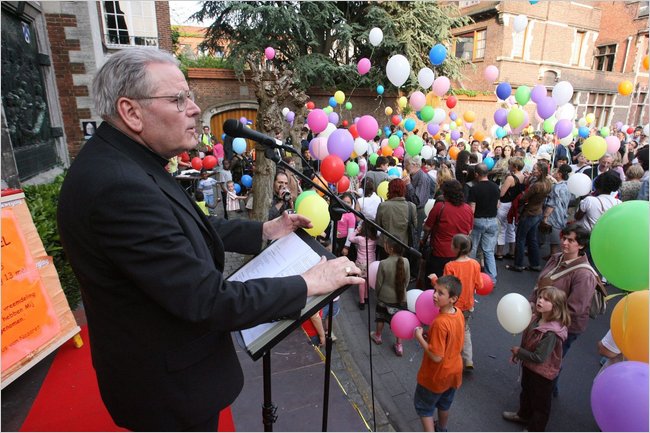|
Outrage in Belgium Over Interview of Ex-Bishop By Stephen Castle and Rachel Donadio
Those revelations prompted hundreds of people to come forward, claiming that they, too, had been victims of priests, and forced Belgium’s Roman Catholic Church into its deepest crisis of recent times. In a broadcast from a location in France, Bishop Vangheluwe, dressed in an open-neck shirt, suggested that the 13-year relationship revealed last year had not been opposed by his nephew, and, in an unexpected new twist, he admitted having abused a second nephew for a much shorter period. The interview with Bishop Vangheluwe, which was conducted on the Flemish channel VT4 and, at his insistence, broadcast live, prompted a storm of criticism from an array of public figures. Although he began by expressing his guilt, he conveyed little if any contrition for his actions, and he said he would not abandon the priesthood unless he was forced to do so. Bishop Vangheluwe is not facing criminal charges because of Belgium’s 10-year statute of limitations, and the Vatican says he is receiving “spiritual and psychological treatment” outside Belgium. But Belgium’s justice minister, Stefaan De Clerck, called on the Vatican to impose a tough punishment. “It should be much more severe and much more complete than what has been said up until now,” he said on RTL radio. This week, the Vatican said that its Congregation for the Doctrine of the Faith was evaluating the bishop’s case and that Pope Benedict XVI himself would eventually rule on the bishop’s fate. Among possible punishments, the pope could remove him from the priesthood. During the interview, to which Bishop Vangheluwe had agreed only on the condition that it would be broadcast live, he denied that he had been driven by sexual motives. “I have often been involved with children and I never felt the slightest attraction,” he said. “It was a certain intimacy that took place.” “I don’t have the impression at all that I am a pedophile,” he continued. “It was really just a small relationship. I did not have the feeling that my nephew was against it — quite the contrary.” “How did it begin?” he said. “As with all families. When they came to visit, the nephews slept with me. It began as a game with the boys. It was never a question of rape, there was never physical violence used. He never saw me naked and there was no penetration.” Bishop Vangheluwe said that the same had applied to the boy abused for a shorter period of time and that the abuse had been restricted to the touching of genitals. Politicians, including the Belgian prime minister, joined church leaders and those campaigning for victims in attacking the comments. “What he has said I find terrible,” said Yves Leterme, Belgium’s prime minister. “It goes beyond what is acceptable.” That sentiment was echoed by Karine Lalieux, the Belgian deputy who led a parliamentary committee on sexual abuse. “I say it’s sickening, disgusting,” she said. “Mr. Vangheluwe has not understood that he has committed crimes, he has minimized and relativized his crimes. I think of the victims and of their suffering.” Lawyers representing victims were equally shocked. “I think it is astonishing how this man does not feel any guilt, does not show any guilt,” said Christine Mussche, a lawyer for dozens of people who claim they were abused by a clergy member. “He’s saying that the victims also enjoyed this, and there is no feeling of regret at all.” Walter Van Steenbrugge, another lawyer representing the victims, said that neither nephew wished to comment. In a strong statement on Friday, the Bishops’ Conference of Belgium said it was “extremely shocked by the way in which Bishop Vangheluwe minimized and made excuses for his actions and the consequences for the victims, their family, believers and the entire society.” It called his actions “unacceptable,” and said that the interview “did not correspond at all” to the period of reflection that the Vatican had asked of him. “The tone of the interview completely contradicts the efforts undertaken in recent months to take the problem of sexual abuse seriously, to listen to the victims and to take appropriate measures.” The Vatican spokesman, the Rev. Federico Lombardi, said Friday that the Holy See was following the case closely, but that he had no comment beyond the statement issued by the Bishops’ Conference of Belgium. But observers noted the damage to the church’s efforts to repair its battered image. Caroline Sagesser, a social scientist at the Université Libre de Bruxelles, said that despite the events of the past year, the church “seems not to have understood that the public opinion was turning extremely hostile to them.” But Bishop Vangheluwe, she noted, was now out of the control of the Belgian bishops — who had insisted on his silence — and under the jurisdiction of the Vatican, which is deciding whether to remove him from the priesthood. “If ever an occasion demanded immediate and severe response from the pope, Vangheluwe’s interview last night is it,” said BishopAccountability.org, an organization that tracks data and documents relating to the Catholic abuse crisis. “Here we have an admitted child molester, until recently one of the most powerful officials in the Belgian Catholic Church, brazenly blaming his young victims for his twisted crimes.” The group noted that last June, Pope Benedict was quick to criticize the raiding of church property by the Belgian police as “deplorable” and said that his failure to condemn Bishop Vangheluwe was “baffling and morally inexcusable.” “His failure to defrock the bishop — an obvious and minimal step — suggests that corrupt clerics continue to get preferential treatment from Rome,” the group said. Stephen Castle reported from London, and Rachel Donadio from Rome.
|
.
Any original material on these pages is copyright © BishopAccountability.org 2004. Reproduce freely with attribution.
